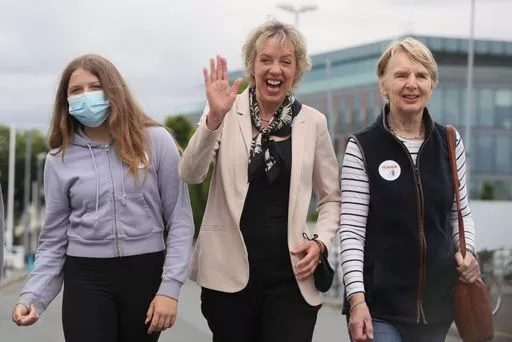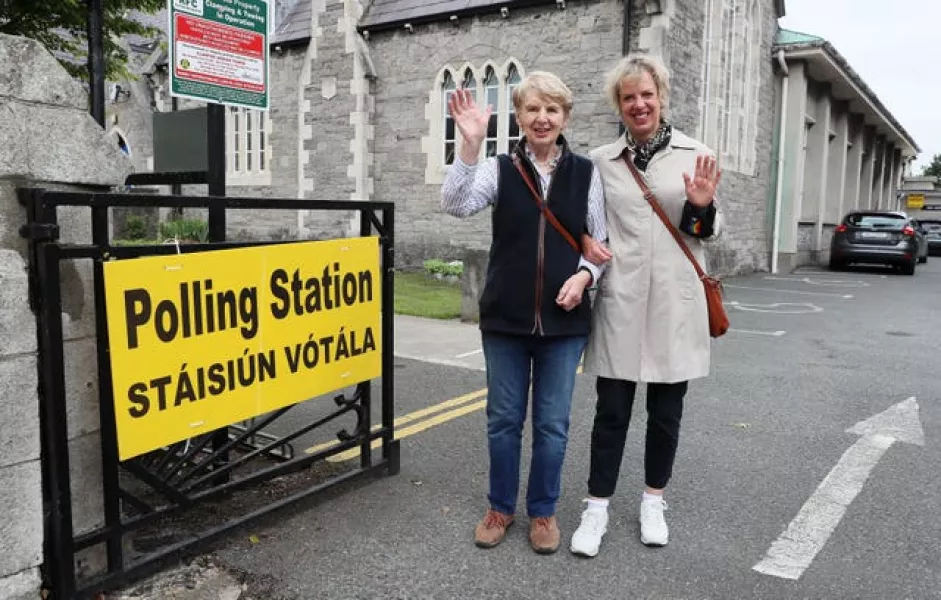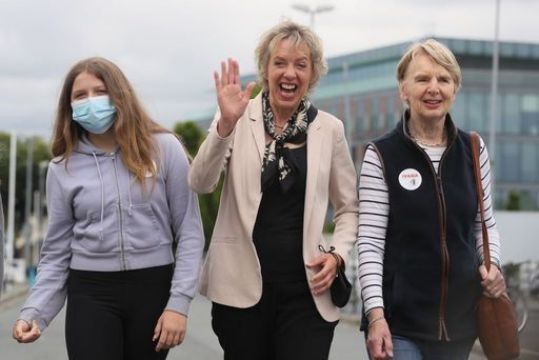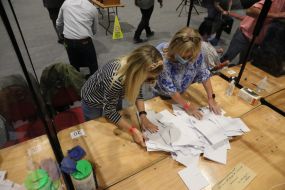Ivana Bacik has been confirmed as the winner in the Dublin Bay South byelection.
The Labour party Senator topped the poll on the first count and was confirmed as the winner on the ninth count, securing 13,382 votes.
She saw off stiff competition from Fine Gael councillor James Geoghegan, who finished on 9,235 votes.
The contest was held to replace former Fine Gael TD and housing minister Eoghan Murphy.
Earlier on, Ivana Bacik has said she was “over the moon” about her pending victory in the Dublin Bay South byelection.
Arriving at the RDS on Friday evening, she said: “I’m overwhelmed, I’m over the moon. Certainly we were getting an enormously positive response on doorsteps across every area in the constituency.
“It perhaps reflects what we were hearing back, but of course you never know until you see the votes cast.”
“What I’ve been hearing throughout the campaign was a message about the need for change” she said.
“People wanted to see a change in Government policy, particularly on housing, but also on other issues around investment in public services.”
She added: “From the non-political party campaigns I’ve been involved with for many years. I think that’s really what gave us an edge, that outpouring of support.”
Congratulating Ivana Bacik on her victory in the Dublin Bay South bye-election, Labour Party Leader Alan Kelly called on the Government to “act on the message of change from voters on housing and childcare”, and said the result showed there was an alternative in Labour to the “divisive politics of other parties”.
Deputy Kelly said: “I want to thank the voters of Dublin Bay South for putting their trust in Ivana Bacik and the Labour Party. She is an exceptional candidate, rooted in Labour values of equality, fairness and social justice, and her message resonated with voters across the constituency.
Positive campaign
“Ivana ran a positive campaign focused on the issues impacting her constituents, that rose above the divisive approach of other parties.
“Ivana Bacik has a track record of delivering real and lasting change. She has long campaigned for a fairer, safer and more tolerant Dublin; and a more equal and progressive Ireland. The result is an affirmation of her decades of work and advocacy and she now has a mandate on her core issues of housing, care, community, and climate action.”
Leo Varadkar also said that they were up against a “very strong” candidate.
“Ivana Bacik has been in politics for 20 years, a national figure, someone who everyone likes and respects and somebody whose arrival in Dáil Éireann is long overdue,” he added.

“Ivana has certainly got a vote that might be considered to be a social liberal vote, a feminist vote, some people will argue that Kate (O’Connell) would have got that.
“I think Ivana would have got that anyway, just look at her record of campaigning on these issues. It’s unparalleled.”
The count got under way at 9am on Friday, and within a few hours Ms Bacik was pulling ahead of her biggest rival, Fine Gael’s James Geoghegan.
Labour members expressed hopes of victory, with many saying she is in a strong position to win.
Polling in the contest to replace Fine Gael TD and former minister Eoghan Murphy closed at 10.30pm on Thursday, with the count taking place at the RDS.
We only have a tally but looks like we will have an Ivana Bacik TD 😭🥳
Ivana- who she is, her values-are the best of us. Today is a very good day. pic.twitter.com/D5xEdju7O7— Rebecca Moynihan (@RebeccaMoy) July 9, 2021
Ireland uses a system of proportional representation rather than the first-past-the-post election method (FPTP) used in the US and the UK.

The proportional representation with a single transferrable vote system, referred to as PR-STV or simply PR, allows voters to rank candidates in order of preference.
If a voter’s first-choice candidate is eliminated, their vote is transferred to their next preferred candidate.
The idea is that it maximises a person’s vote, with fewer votes discarded than in the FPTP system.

Turnout in the contest picked up on Thursday evening after a relatively slow start.
By around 9pm, the average voter turnout had reached 40 per cent, compared with 34 per cent at 8pm and 24 per cent in the early evening, according to figures from RTÉ.
That is on a par with the last byelections in 2019, when four contests saw turnouts of between 25 per cent and 35 per cent.

But it remains well below the 2020 general election, when turnout was 62.9 per cent nationally, and 52 per cent in Dublin Bay South.
Thursday’s vote was Ireland’s first electoral contest since the coronavirus pandemic began, but it remains to be seen if that affected turnout.

A series of safety arrangements were put in place to ensure the byelection was held in accordance with Covid-19 public health advice.
Hand sanitiser was available at all polling stations, while voters were asked to wear masks and observe social distancing rules when inside.
Polling hours were extended by 30 minutes to assist the extra arrangements, closing at 10.30pm instead of the traditional 10pm.
University College Dublin professor and anti-lockdown campaigner Dolores Cahill was prevented from entering the count centre after she refused to wear a face mask.

Ms Cahill, who ran as an independent candidate, attempted to push through a number of gardai and security officers to gain access.
The outspoken critic of Covid-19 restrictions was joined by a few supporters, who also refused to wear face coverings as required under health regulations.
The academic, who is no longer lecturing at UCD, demanded the identity of the garda, who repeatedly told her his name and the station he is associated with.
She left a short time later.
Other candidates in the election include Deirdre Conroy, of Fianna Fáil, while councillor Claire Byrne is running for the Green Party.
The Social Democrats are represented by Sarah Durcan, while the People Before Profit candidate is Brigid Purcell.

The current TDs in the constituency are Fianna Fáil’s Jim O’Callaghan, Sinn Fein’s Chris Andrews and Green Party leader Eamon Ryan.
Long considered a Fine Gael heartland, Dublin Bay South is home to the affluent suburbs of Terenure, Rathmines, Rathfarnham and Ballsbridge.
The other candidates in Dublin Bay South are Justin Barrett (National Party), Jacqui Gilbourne (Renua), Mairead Toibin (Aontu) and independents Peter Dooley, Mannix Flynn, John Keigher and Colm O’Keefe.







